- Home
- Amelia C. Adams
Tabitha: Bride of Missouri (American Mail-Order Bride 24) Page 2
Tabitha: Bride of Missouri (American Mail-Order Bride 24) Read online
Page 2
Tabitha nearly replied that she wasn’t ten anymore, but pressed her lips together instead. Clara would probably see her as a child for a long time to come, and Tabitha should just be grateful to have family in her life at all. She went back upstairs and washed her hands and face, then decided to brush out her hair and braid it again. That was one thing she detested about train travel—the dust did have a way of settling everywhere.
A tapping on the door set a dog somewhere in the neighborhood to barking, and Tabitha quickly finished pinning her hair back in place. When she came down the stairs, she saw a pleasant-looking fellow sitting in the parlor, talking to Herbert. He rose when she came in the room.
“Miss Phillips?” He held out his hand. “I’m Pastor Reed. I understand you’ll be joining our congregation.”
“That’s right. It’s a pleasure to meet you.”
“And you.” He was still grasping her hand, which seemed a little odd.
Tabitha took a step back and slipped her fingers from his clutches. “And you’re new in town, from what Clara told me.”
“That’s right. I’ve been here six months.”
They both sat, the awkwardness of the silence building with each second. Herbert, who never was talkative, certainly wasn’t helping.
“You came here from Massachusetts?”
“That’s right. I lived there for the last two years.”
“I see.” He nodded several times as though she’d said something enlightening.
“And where did you live before coming here?” She supposed she could return the favor.
“Pennsylvania, if you can imagine that.” He chuckled.
What was so unbelievable about coming from Pennsylvania? She was about to ask, but just then, Clara called them in to dinner. The timing couldn’t have been more perfect.
Tabitha had never been forced to endure a more stiflingly boring meal in all her life. Pastor Reed politely inquired after the post office, and then there really was nothing left to talk about except the weather. Yes, it had been a rather humid summer. Yes, that would probably mean greater snowfall that winter. Yes, that would mean good things for next year’s crops. No, Tabitha really couldn’t compare the humidity of Massachusetts with the humidity of Missouri—she hadn’t taken much notice. Gracious. Would this meal never end?
Finally, Pastor Reed cleared his throat and said something that did catch Tabitha’s attention. “I wonder, Miss Phillips, if you would allow me to escort you to the fall festival this coming Saturday night.”
Tabitha blinked. “I . . . didn’t realize I’d need an escort,” she said, fumbling for words.
“Well, you don’t officially need an escort, but I thought it might be enjoyable.” He smiled, looking a little pained, and Tabitha realized she must have sounded rude.
She glanced over at Clara, who seemed embarrassed. Oh, dear. This wasn’t the way to start afresh here.
“I’d be delighted,” she said, turning back to the pastor. “I think I’d enjoy it very much.”
He leaned back in his chair and beamed. “Excellent. I’ll call for you at one o’clock, shall we say?”
“One it is.”
He left shortly afterward, and Tabitha let out a sigh of relief. She was so glad that was over. Maybe he’d have more interesting things to talk about at the festival when they weren’t confined around a dining room table, being watched by Herbert and Clara. He might even turn out to be a good friend. She doubted it, but she would give him every chance. Sometimes first impressions went horribly wrong.
With that thought, she stepped into the kitchen and began to scrape the dinner dishes. Clara whirled from her spot at the wash basin and scowled at her.
“Don’t know what your expectations are now that you’ve been seeing the world, young lady, but you need to keep in mind who you are and where you came from. Pastor Reed is a kind man, and he took time to show some interest in you. Acting all high and mighty—you better get off that right now.”
Tabitha was taken aback. Clara hardly ever said more than one sentence at a time, but her anger had given her words. “I’m sorry, Clara. I didn’t mean anything by it. I was just surprised when he invited me.”
“You shoulda been flattered.”
Tabitha set down the plate she’d just scraped. “Flattered? I’m not sure what you mean.”
“That the pastor has chosen you.” Clara looked at her as though it should be obvious.
“Chosen me?”
“Oh, come on now. Can’t be that naïve.” Clara wiped her hands on her apron. “New pastor, needs a wife, asks you to the festival. Plain as the nose on my face.”
Tabitha grabbed another plate, dread creeping into her stomach. She didn’t want the pastor to be interested in her. Sure, she could spend a little time in his company, but marriage was far and away beyond anything she could imagine. She wanted to fall madly in love before she got married, and Pastor Reed was not someone to fall madly in love with. The young man from the train station flitted through her mind, but she pushed the thought aside. Now was not the time for silly daydreams.
“Post office opens at ten,” Clara went on. “You’ll work there, same as always.”
Tabitha hadn’t expected anything less. “I’ll be glad to.” She didn’t see any more plates to scrape, so she wiped down the table and made sure the chairs were straight. “If it’s all right with you, I’ll go to bed now. It’s been a long day.”
Clara didn’t answer, so Tabitha took that as a yes and climbed the stairs. Not even home for one day, and she had already been assigned to marry the pastor. Maybe this had all been a big mistake.
Oh, how she wished she could talk to her friends. They always knew what to do. Well, she supposed she could do the next best thing and write to them. She changed into her nightdress and then pulled out some paper, jotting a note to each of the girls she knew so well from the mill. She could almost hear their responses to everything she said, and for a little while, it was like being reunited with them.
Chapter Two
“Ease up there. Steady, steady.”
Thomas Scott balanced the log on his shoulder and eased it from the wagon bed. The two horses that pulled the wagon seemed skittish for some reason, and the driver was having a hard time keeping them still. As the mill workers unloaded the bed, the animals stepped from side to side, forward and backward, almost reminding Thomas of a waltz. He smiled. Maybe they were getting ready for the fall festival.
He wished Ivy could be there for the dance. He could just imagine holding her as they twirled around the floor. No matter that he wasn’t much of a dancer—he had the feeling that with Ivy in his arms, he could do anything.
“Hey, Scott! Quit your daydreaming.”
Thomas looked up and grinned at his burly coworker. “Sorry, Hoss.”
Hoss shook his head. “You’re thinking about that girl again, aren’t you? You always go someplace in your mind, and I have to yell to get your attention. Just marry her, would ya? Then maybe we could get some work done.”
“See, that’s just the thing.” Thomas lowered his burden to the floor of the mill and headed back for the next log, Hoss beside him. “I would marry her, but she hasn’t set the date.”
“Why don’t you set it for her? Tell her that she’s coming on the noon train on such-and-such day and you’ll meet her at the station and that’s how it’s going to be.”
Thomas chuckled. “That’s not how women are, Hoss. You can’t just order them around.”
“Why not? Things would sure get done faster.”
“Fast isn’t always best. I want her to be happy, and if she needs a little extra time to have her dress made or whatever, she should have it.”
Hoss grunted as he set down the next log, Thomas steadying the other end for him. “I suppose it’s your choice to make, but if it were up to me, I’d give her a date, tell her to be here, and be firm about it. I think she’s playing you for a fool.”
“Oh, come on now, Hoss. You don’t know her. She’
s not that way.”
Hoss paused. “And you know her so much better?”
“Well, no. Not really,” Thomas admitted as he went back for his next load. “But I know she’s not using me. What would she have to gain? I’m hardly rich or influential, and she’s aware of that.”
Just then, the wagon gave another lurch, and the log Thomas had been reaching for toppled off the stack and crushed his hand against the side of the wagon. A jolt of pain raced up his arm and into his elbow, causing him to yell out.
“Scott!” Hoss threw down his log and raced over, grabbing the log that had pinned Thomas’s hand. He hefted it back, and Thomas clutched his arm to his chest. The pain was unlike anything he’d felt before.
“Let me see.” Hoss all but grabbed Thomas’s hand. “That looks broken—better get the doctor.”
“I’ll go,” Peter called out, taking off at a trot.
“It better not be broken,” Thomas said through gritted teeth. “I’ve got work to do.”
“I know, I know—saving up for a train ticket for your little lady.” Hoss shook his head. “You’d better reconcile yourself to the fact that you might be outta commission for a while. These things happen, you know.”
“I know. I just . . . I have plans.” Thomas tried to flex his fingers, but they wouldn’t move. He pushed down the panic he felt. This couldn’t be permanent—once the doctor came, he’d set it or wrap it or do whatever doctors did in cases like this. Then, after a few weeks, Thomas would be fine.
Mr. Charles, Thomas’s boss, strode across the dirt yard from his office, his thumbs hooked through his suspender straps. He always looked a bit like a rooster on patrol. “What happened, Scott?”
“Hand got caught between a log and the side of the wagon, sir,” Thomas replied.
“Hmm. Rotten piece of luck. Doctor coming?”
“Peter went to get him,” Hoss said.
Mr. Charles gave a sharp nod. “Come see me after you’re looked at.” He strode back the way he’d come, never one for long conversations.
Thomas sat down on a crate and shook his head. “This isn’t good, Hoss. If the doctor says I’m out of it for a while, I’m going to lose my job.”
“And if you do, you’ll get another one.” Hoss slapped Thomas on the back. “Listen, boy. Stop borrowing trouble. Wait to see what the doctor actually says before you start conjuring up all these dramatic outcomes. I said it looked broken, but what do I know? I’m a sawyer. Step at a time, boy. Step at a time. Now take a minute and calm yourself, and the rest of us will unload this wagon.”
Thomas did as he was told, trying to ignore the throbbing pain as he watched the other men finish up the job. He very much disliked the fact that he wasn’t helping them—he hated being idle. But if he tried, chances were, he’d hurt his hand even worse, and that wouldn’t solve anything.
Dr. Gideon hurried across the mill yard, Peter on his heels. “What have we here?” he said as he came to a stop at Thomas’s side. “Bit of an accident?”
“Yes, sir. Crushed my hand.” Thomas held it out for inspection.
“Come out here into the sunlight.” The doctor adjusted his spectacles on the bridge of his nose and then peered at Thomas’s hand. He took hold of the fingers and straightened them, causing Thomas to suck in his breath through his teeth.
“Well, son, I’d say you’ve broken a couple of fingers,” Dr. Gideon said at last. “Nothing that won’t heal, given time, but this hand isn’t to be used. I’d like you to come back to my office with me, where we’ll set the bones and get you squared away.”
“Yes, sir,” Thomas said, then turned to Hoss. “Will you tell Mr. Charles I’ll be back in a little while? I know he’s waiting for me.”
“Sure,” Hoss replied. “Go get yourself fixed up.”
All the way to the doctor’s office, the words rang in Thomas’s ears. This hand isn’t to be used. Just how long were they talking? He couldn’t afford to be out of work—not with a bride in the offing.
He sat on the indicated chair in the doctor’s office and held out his hand once again. Dr. Gideon shook his head as he examined it for the second time. “Sure enough, it’s broken, all right. First and second fingers. Third one’s not broken, but it’s going to be plenty bruised and sore for a while, and same with the fourth.” He peered into Thomas’s face. “How’s your pain threshold?”
The question caught Thomas off guard. “Pretty good, I guess. I haven’t tested it too often.”
“Well, this might not be the most pleasant experience you’ve ever had, but I need to set these finger bones, and that means I need to tug on them. Now, they’re pretty small bones, so you might think they won’t hurt much, but they will, because they’re broken. Prepare for a sharp pain, and then it will fade.”
Thomas nodded. That really didn’t sound pleasant, but if that’s what it took to heal his hand, of course that’s what they’d do.
“I’m going to mix up some plaster of Paris. Then I’ll soak some bandages in it and wrap them around your hand. It will harden into a cast, and this will help you keep your fingers immobile while they heal. You’ve actually broken your first finger down below the knuckle as well—see here, on the back of your hand, down toward your thumb?” He indicated, and Thomas nodded. “A cast will be very beneficial to you. Now, I’m not putting a cast on each finger—that would be a bit silly. Instead, I’m going to wrap the hand up sort of like you’re wearing a mitten, with all the fingers together. Do you have any questions?”
“So the wrapping is going to be hard?” Thomas asked.
“That’s right. It will hold your hand still, and it will also protect the fingers from getting bumped and further injured. You’ll just need to be careful not to punch yourself in the face in your sleep.”
The doctor said this so seriously that for a moment, Thomas didn’t realize the man was joking. Then a slight twinkle of the eye gave him away. “I’ll do my best to avoid it,” Thomas said with a chuckle.
Dr. Gideon reached into his many cupboards and pulled out the needed supplies. As he laid everything out on the counter, Thomas glanced around the room. Three walls were covered with shelves, cabinets, and drawers. The fourth wall held the window, the door, and a painting of a mountain range.
“The Ozarks?” he asked, nodding toward the picture.
“That’s right. I was born and raised in southern Missouri. What about you?”
“Kansas. Near Topeka.” Thomas could see the bruising getting worse. That log must have landed just right to cause this much damage.
“And what brought you to Atwater?” The doctor spoke in a distracted way while he measured some white powder into a bowl. Thomas wondered if he’d even hear the answer, but the questions did help take the edge off the pain.
“Decided I needed a fresh start, something different. I hopped on the train, figuring I’d go to St. Louis, but when the train stopped here, I took a look around and sort of fell for the place. The lumber mill was hiring and I had experience, so it seemed almost providential.”
Dr. Gideon nodded. “There is something special about this town, that’s for sure. It’s small and tight knit. Mrs. Gideon convinced me to buy the home next to her father’s place, and we’ve enjoyed it here ever since. This next part, though, neither of us will enjoy. Are you ready for me to set the bones?”
Thomas pressed his lips together and nodded.
Dr. Gideon grasped Thomas’s wrist with one hand and his first finger with the other. Then he braced his feet on the floor and gave the bone a swift, sharp tug. Thomas gasped as pain raced up his arm, through his shoulder, and down his back, but as the doctor had promised, the pain did ease after several seconds.
Then it was time to do the second bone. Thankfully, that one wasn’t nearly so painful.
Dr. Gideon took a short length of bandage and wrapped it around Thomas’s hand just snugly enough to stay in place. “This will protect your skin from the itchiness of the plaster,” he explained.
; “Now, don’t move. Not even a muscle.” He turned to his bowl, poured water over the powder, and stirred it together. Then he took a length of gauze and plunged it into the mixture. “I have to work quickly before the stuff sets up.”
He wrapped the wet fabric around and around Thomas’s hand. “Can you wiggle your fingers?”
Thomas tried, but the muscles still wouldn’t respond.
“Well, I’ll just assume I got it on there tightly enough. I’ve done this a few times before—I should know what I’m doing.” The doctor tucked in the end of the bandage, then smoothed out the edges with fingers that were coated with the white mixture. “There now. What do you think? Can you live with that for a while?”
“That all depends. How long is a while?”
“And that is the trickiest question of all.” The doctor moved to scratch his face, then
stopped short when he saw the stuff all over his hand. “I’ll have to make an educated guess and say one month.”
“A month?” Thomas closed his eyes. That was forever for a working man. He had obligations to meet.
“I’m sorry, son. I really am. But that’s the reality of it.”
Thomas nodded and opened his eyes. There was nothing else that could be done about it. “Then we’ll make do. Thanks, Doc.”
“You’re welcome. Now, it’s going to be a few more minutes before that’s set up hard, so just relax.” He paused. “Would you like a pancake?”
“A pancake, sir?” What an unexpected question.
“Mrs. Gideon makes a very nice pancake, and I believe I heard her mention she was going to make some this morning. That would be a nice way to occupy your time until your cast is dry.”
Thomas never turned down free food. “All right. Thank you, sir.”
Dr. Gideon led the way into the family portion of the building and showed Thomas to a seat at the dining room table. Then he disappeared, probably to tell his wife about their guest. A moment later, a round woman with flour all over her apron bustled out of the kitchen to greet Thomas.
“Well, hello! Oh, you don’t have to stand up—it’s just me.” She chuckled. “Doctor tells me you’ve gone and broken your hand. That’s such a shame. I’m sure he got you good and fixed up, though—he does so enjoy putting broken things back together. Yanking things back into their sockets and so forth.”

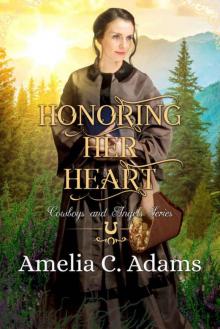 Honoring Her Heart
Honoring Her Heart Buttons and Bows
Buttons and Bows An Agent for Emily
An Agent for Emily Christmas Catch-Up VIII (River's End Ranch)
Christmas Catch-Up VIII (River's End Ranch) A Rancher for Rowena
A Rancher for Rowena Candice (Seven Sisters Book 6)
Candice (Seven Sisters Book 6) Butterfly Kisses
Butterfly Kisses A Stitch in Time
A Stitch in Time Buttons and Bows (The Sewing Circle Book 3)
Buttons and Bows (The Sewing Circle Book 3) Sidearms and Songbirds (Hearts of Nashville Book 3)
Sidearms and Songbirds (Hearts of Nashville Book 3) Herd to Breathe
Herd to Breathe The Ties That Bind
The Ties That Bind Rhyme or Reason
Rhyme or Reason Revelations (Brody Hotel Book 4)
Revelations (Brody Hotel Book 4) Phoebe's Fate (Burnt River Contemporary Western Romance Book 9)
Phoebe's Fate (Burnt River Contemporary Western Romance Book 9) And Something Blue (Main Street Merchants Book 1)
And Something Blue (Main Street Merchants Book 1)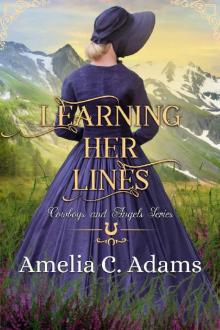 Learning Her Lines
Learning Her Lines Connections
Connections The Turn of a Wheel (Kansas Crossroads Book 17)
The Turn of a Wheel (Kansas Crossroads Book 17) Just Desserts (Main Street Merchants Book 4)
Just Desserts (Main Street Merchants Book 4) An Agent for Anna
An Agent for Anna An Agent for Esme
An Agent for Esme A Handyman for Helen
A Handyman for Helen Scented Sensibility
Scented Sensibility Addie's Adventurer
Addie's Adventurer Defying the Darkness
Defying the Darkness Riding the Rails
Riding the Rails Sugar And Spice (Main Street Merchants Book 7)
Sugar And Spice (Main Street Merchants Book 7) An Agent for Cynthia
An Agent for Cynthia In The Stars (Main Street Merchants Book 6)
In The Stars (Main Street Merchants Book 6) Moonlight With Alice (The Matchmaker's Ball Book 3)
Moonlight With Alice (The Matchmaker's Ball Book 3) Five Golden Rings (Main Street Merchants Book 3)
Five Golden Rings (Main Street Merchants Book 3) Between The Lines (Main Street Merchants Book 5)
Between The Lines (Main Street Merchants Book 5) An Agent for Lucy
An Agent for Lucy Jessica (Seven Sisters Book 2)
Jessica (Seven Sisters Book 2)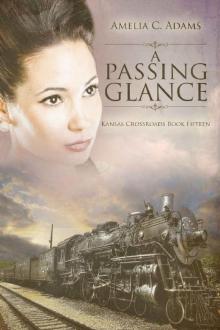 A Passing Glance
A Passing Glance Pet Peeves
Pet Peeves RNWMP: Bride for Joel
RNWMP: Bride for Joel Bowing to Betsy (The Matchmaker's Ball Book 11)
Bowing to Betsy (The Matchmaker's Ball Book 11) Rebekah (Seven Sisters Book 4)
Rebekah (Seven Sisters Book 4) A Joyful Noise (Kansas Crossroads Book 14)
A Joyful Noise (Kansas Crossroads Book 14) Her Second Chance Hometown Groom
Her Second Chance Hometown Groom A Christmas Promise (Kansas Crossroads Book 16)
A Christmas Promise (Kansas Crossroads Book 16) Bride for Samuel
Bride for Samuel Bribing the Blacksmith (Cowboys and Angels Book 9)
Bribing the Blacksmith (Cowboys and Angels Book 9) RNWMP: Bride for Samuel (Mail Order Mounties Book 12)
RNWMP: Bride for Samuel (Mail Order Mounties Book 12) Tea for Two
Tea for Two The Bitter and the Sweet (Kansas Crossroads Book 9)
The Bitter and the Sweet (Kansas Crossroads Book 9) Frank (Seven Sons Book 6)
Frank (Seven Sons Book 6) A Cattleman for Cora
A Cattleman for Cora Paislee's Path (River's End Ranch Book 48)
Paislee's Path (River's End Ranch Book 48) Accidental Agent (River's End Ranch Book 3)
Accidental Agent (River's End Ranch Book 3)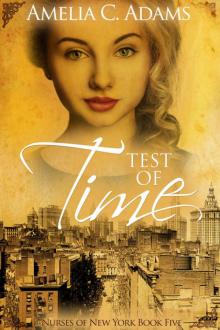 Test of Time (Nurses of New York Book 5)
Test of Time (Nurses of New York Book 5) RNWMP: Bride for Michael (Mail Order Mounties Book 24)
RNWMP: Bride for Michael (Mail Order Mounties Book 24) Loving the Landlord
Loving the Landlord The Dark and the Dawn (Kansas Crossroads Book 3)
The Dark and the Dawn (Kansas Crossroads Book 3) Candy Crush
Candy Crush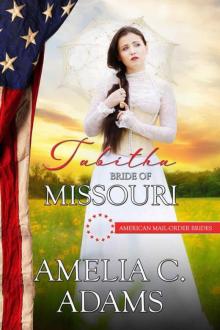 Tabitha: Bride of Missouri (American Mail-Order Bride 24)
Tabitha: Bride of Missouri (American Mail-Order Bride 24)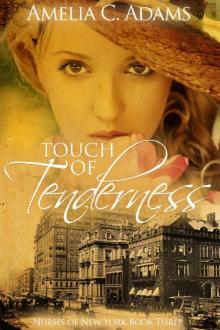 Touch of Tenderness (Nurses of New York Book 3)
Touch of Tenderness (Nurses of New York Book 3) Lucky Lifeguard (River's End Ranch Book 28)
Lucky Lifeguard (River's End Ranch Book 28) Heartstrings (Brody Hotel Book 2)
Heartstrings (Brody Hotel Book 2) Heart of Hearts (Nurses of New York Book 4)
Heart of Hearts (Nurses of New York Book 4) Hope_Bride of New Jersey
Hope_Bride of New Jersey A Careless Wind (Kansas Crossroads Book 7)
A Careless Wind (Kansas Crossroads Book 7) An Agent for Emily (The Pinkerton Matchmaker Book 28)
An Agent for Emily (The Pinkerton Matchmaker Book 28) A Twisted Fate
A Twisted Fate Delivering Destiny (River's End Ranch Book 23)
Delivering Destiny (River's End Ranch Book 23)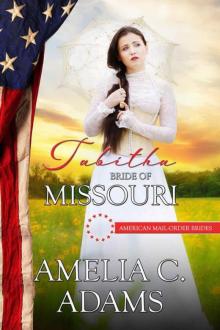 Tabitha_Bride of Missouri
Tabitha_Bride of Missouri A Wrangler for Wynonna
A Wrangler for Wynonna RNWMP_Bride for Peter
RNWMP_Bride for Peter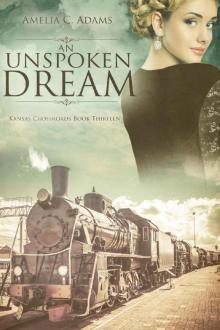 An Unspoken Dream (Kansas Crossroads Book 13)
An Unspoken Dream (Kansas Crossroads Book 13) Generations
Generations Utah Sunrise (Rocky Mountain Romances Book 1)
Utah Sunrise (Rocky Mountain Romances Book 1) Bride for Jonathan
Bride for Jonathan Bribing the Blacksmith
Bribing the Blacksmith A Clean Slate (Kansas Crossroads Book 4)
A Clean Slate (Kansas Crossroads Book 4) Hope: Bride of New Jersey (American Mail-Order Brides 3)
Hope: Bride of New Jersey (American Mail-Order Brides 3) Rugged Rockclimber (River's End Ranch Book 8)
Rugged Rockclimber (River's End Ranch Book 8) RNWMP_Bride for Michael
RNWMP_Bride for Michael RNWMP: Bride for Joel (Mail Order Mounties Book 4)
RNWMP: Bride for Joel (Mail Order Mounties Book 4) Tea For Two (Cowboys & Angels Book 15)
Tea For Two (Cowboys & Angels Book 15) Sweet Georgia Peach
Sweet Georgia Peach RNWMP: Bride for Peter (Mail Order Mounties Book 20)
RNWMP: Bride for Peter (Mail Order Mounties Book 20) A Clear Hope (Kansas Crossroads Book 5)
A Clear Hope (Kansas Crossroads Book 5) Meredith's Mistake (Grandma's Wedding Quilts Book 4)
Meredith's Mistake (Grandma's Wedding Quilts Book 4) RNWMP_Bride for Samuel
RNWMP_Bride for Samuel The Whisper of Morning (Kansas Crossroads Book 6)
The Whisper of Morning (Kansas Crossroads Book 6) RNWMP: Bride for Jonathan (Mail Order Mounties Book 8)
RNWMP: Bride for Jonathan (Mail Order Mounties Book 8) Santa's Shopkeeper (River's End Ranch Book 18)
Santa's Shopkeeper (River's End Ranch Book 18)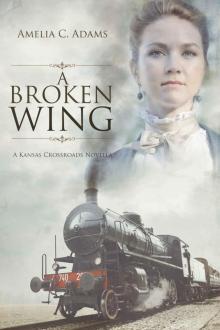 A Broken Wing (Kansas Crossroads)
A Broken Wing (Kansas Crossroads)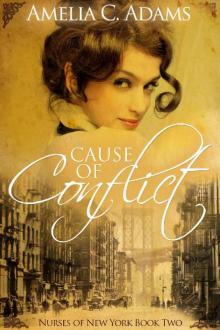 Cause of Conflict (Nurses of New York Book 2)
Cause of Conflict (Nurses of New York Book 2)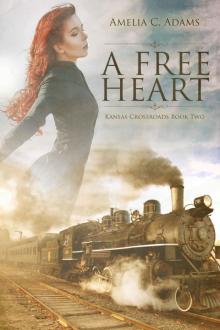 A Free Heart
A Free Heart A New Beginning
A New Beginning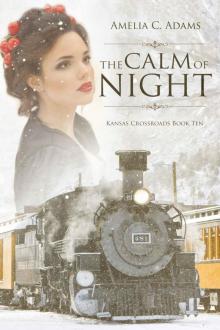 The Calm of Night (Kansas Crossroads Book 10)
The Calm of Night (Kansas Crossroads Book 10) Bride for Calvin
Bride for Calvin Sea of Strangers (Nurses of New York Book 1)
Sea of Strangers (Nurses of New York Book 1)